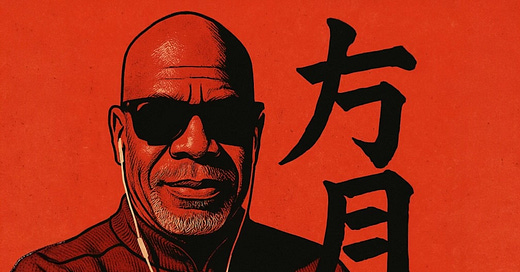I have found that there are obsessions in life that grip the soul slowly, like a morning fog crawling over a lake.
And then there are obsessions that seize you like a kung fu grip from a Shaolin monk—firm, mysterious, and oddly comforting.
My latest obsession with learning Mandarin Chinese characters falls firmly into the latter camp. I can’t shake it. I don’t want to. I’m convinced this is no passing phase or curious intellectual fling. No, this is cosmic alignment, baby.
You might ask: what business does a Chocolate man with a lineage to the cotton fields of the Deep South and jazz clubs have to do with learning the delicate brushstrokes of a language born in dynasties? My answer: perhaps everything.
Maybe my ancestral path—tattered by displacement but rich in rhythm and reverence—has spiraled full circle into something far older than my DNA test results could ever reveal.
I’m not just trying to learn Chinese for kicks. I’m after something far deeper: transmission.
I want to feel the Tao Te Ching when I read it, not just understand the translation. I want to absorb the wisdom of the I Ching, not just toss the coins and hope for a good hexagram. There’s something sacred about a language that doesn’t just spell words, but paints meaning. Each character is a philosophy lesson, a miniature ideogrammatic poem.
Confronting Some Interesting Characters
But let’s not romanticize too much—this path is anything but easy. Mandarin is the linguistic Everest of the East. Four tones, thousands of characters, and a grammar structure that can make a grown man whimper into his tea.
The character for “heart” (心) appears in more compound words than I can count, and somehow it always points to something I feel rather than something I know. That, too, is sacred.
Sometimes I laugh at myself. I’ll spend twenty minutes practicing how to write 愛 (ài), which means “love,” only to have it look like a toddler went rogue with a crayon. And yet, I keep going.
Because embedded in that struggle is my yearning for a deeper connection—not just with Taoist wisdom, but with the cosmic interconnectedness of all things.
And yes, I believe there’s a connection between my Blackness and this ancient script. Both carry the weight of history. Both were born of pain and resilience. Both hold secrets passed not through brute force, but through subtlety—through rhythm, gesture, expression, and coded language.
Jazz and calligraphy are cousins in this cosmic lineage. One flows with saxophone improvisation. The other flows with ink on rice paper.
Some might say this is cultural appropriation. I say it’s cultural integration. I’m not trying to own Mandarin. I’m trying to honor it, to fold it into the philosophical patchwork quilt that
I’ve been stitching together since I first read Lao Tzu in a Chicago bookstore and felt my soul nod in recognition. That nod was ancestral. That nod was sacred.
The I Ching and Tao Te Ching Speak
The I Ching has already spoken to me on this. In Hexagram 61, Zhong Fu—“Inner Truth”—it tells us that real understanding comes from sincerity and openness, not rote memorization.
“Piglets and fishes. Good fortune.” That’s not a riddle. That’s an invitation to humble yourself, to approach your quest like a child chasing koi in a pond: playfully, curiously, without ego.
The Tao Te Ching, ever the trickster sage, would likely smirk at my quest and say: “Stop trying so hard.” It reminds me in verse after verse that wu wei—effortless action—is the way. That maybe I don’t need to master Mandarin in order to master the Tao, but rather become so immersed in the flow that the language seeps into me like tea into porcelain.
And yet, here I am, obsessively scribbling radicals like a man possessed. Some days I wonder if I’m trying to decode the Tao, or if the Tao is decoding me. Either way, I’m committed. This isn’t a class. This is a calling.
So yes, this Black Taoist is learning Mandarin, one radical at a time. I may never reach fluency, but I will reach fluency of spirit. And that, in the end, is the kind of literacy the Tao truly respects.
After all, in both jazz and the Tao, the space between the notes—the pauses, the silences, the brushstrokes left unfinished—speak louder than the noise.
Would you be kind enough to consider supporting full-time independent writers like me by subscribing today. Or, if you’re feeling generous in a small way, maybe you’ll wanna send a little (or a lot) of dirty chai latte love my direction. Every bit helps keep this Taoist journey flowing.





I love this post and what you're doing.
'After all, in both jazz and the Tao, the space between the notes—the pauses, the silences, the brushstrokes left unfinished—speak louder than the noise'
Love this necessary distinction between “appropriation” and “integration.” Beautifully put 🙏🏼 Good luck on your new language journey!